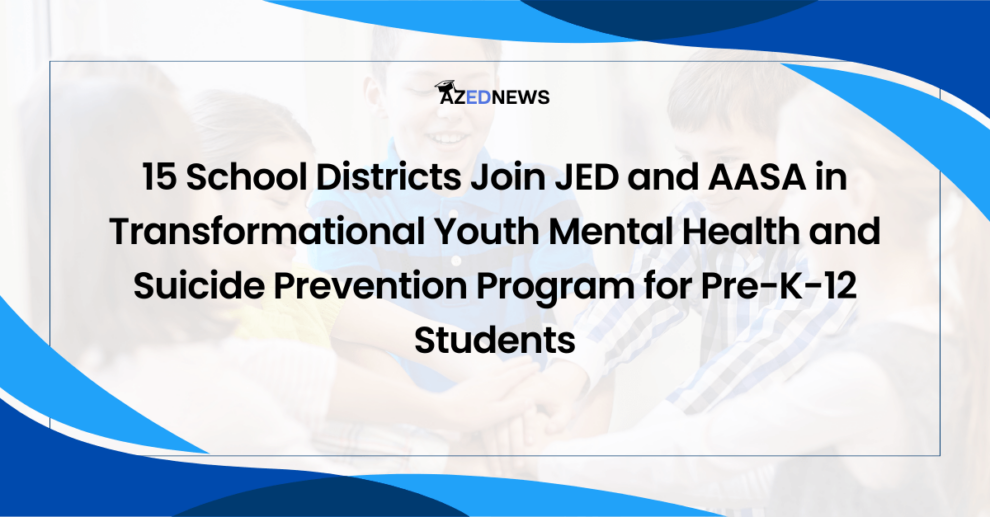Pilot cohort convenes March 20-21 with districts across 14 states, serving diverse populations of students in rural, suburban, and urban communities.
[March 20, 2024-Alexandria, Virginia and New York, New York] The Jed Foundation (JED) and AASA, The School Superintendents Association, announce the selection of 15 school districts to participate in the District Comprehensive Approach (DCA) pilot, a transformational program that guides districts in improving systems of support for pre-K-12 students’ emotional well-being. Inaugural district cohort members will be at the forefront of learning and leading powerful mental health and suicide prevention practices that will benefit both staff and students.
In addition to powerful professional learning experiences, program participants will receive a written locally developed district strategic plan to serve as a roadmap for building comprehensive student mental health and suicide prevention programming. All participating districts will also receive two years of technical assistance from JED experts as they implement their plans to enhance systems of support to create first-class school mental health systems.
In just its first year, the inaugural DCA cohort class of 2024 will serve more than 356,000 students from 480 schools across 14 states. The full list of school districts includes:
- Chandler Unified School District (Chandler, Arizona)
- Fargo Public Schools (Fargo, North Dakota)
- Hardin Public Schools (Hardin, Montana)
- Harford County Public Schools (Bel Air, Maryland)
- Kuspuk School District (Aniak, Alaska)
- Laurens County School District 55 (Laurens, South Carolina)
- Minnetonka Public Schools 276 (Minnetonka, Minnesota)
- Montgomery County Public Schools (Rockville, Maryland)
- San Ramon Valley Unified School District (Danville, California)
- Scarsdale Public Schools (Scarsdale, New York)
- Silvis School District (East Moline, Illinois)
- Stafford County Public Schools (Stafford, Virginia)
- Summit Academy North (Romulus, Michigan)
- Vineland Public Schools (Vineland, New Jersey)
- Washington Local Schools (Toledo, Ohio)
The cohort’s first official convening is slated for March 20-21, 2024. Participating school districts will join several virtual workshops, led by JED’s experts and AASA’s educational leaders, to outline the DCA program. The sessions are packed with a combination of learning, connection, and actionable insights education leaders will bring back to their districts. Topics will include district readiness for mental health systems change, an overview of the DCA self-assessment, perspectives from a high school student, and the impacts of social media, artificial intelligence, and virtual reality on student mental health.
“School leaders know that getting in front of the youth mental health crisis requires thinking far beyond one-size-fits-all approaches,” says David R. Schuler, executive director at AASA. “That’s why we’re partnering with JED to launch a comprehensive, transformative, and scalable district-wide approach that is designed to meet this urgent need. This initiative will provide an evidence-based framework combined with the expert support, best practices, and data-driven guidance our students, families, staff, and caregivers deserve.”
According to the Centers for Disease Control and Prevention (CDC), 42% of high school students reported feelings of sadness or hopelessness in the past year. This rate has grown significantly for female students from 36% in 2011 to 57% in 2021. Meantime, suicide continues to be the second leading cause of death for 10- to 34-year-olds, following accidents. In recent years, suicides among younger children, ages 5 to 11 in elementary schools, have increased by 15% per year.
“The District Comprehensive Approach by JED in partnership with AASA is a milestone moment marking the start of systemic and structural change for youth mental health and suicide prevention across the public education system,” says Tony Walker, senior vice president of academic programs at JED. “This first group of district cohort participants are true trailblazers, reinventing how schools help students — and their mental health — thrive, not just in their hometown, but now, nationwide.”
In April 2023, JED and AASA formed an exclusive partnership to develop and deploy the District Comprehensive Approach program, together, providing pre-K–12 school districts across the nation with an evidence-based framework — combined with expert support, best practices, and data-driven guidance — to protect mental health and prevent suicide for millions of students. This collaboration combines JED’s 25 years of experience protecting emotional health and preventing suicide for more than 1,200 schools, districts, and campuses with AASA’s 150-year commitment to serving public education and school district leadership. The creation of the DCA establishes and exemplifies the significance school district leaders are placing on their students’ emotional health.
The DCA derives from JED’s evidence-based High School Comprehensive Approach. Through this framework, school districts will ensure that existing systems support the mental health of — and reduce suicide risk for — all students.
For more information on the DCA program, participation, and the AASA Leadership Network, visit JED’s website.
Quotes from local DCA cohort superintendents can be found below.
Expanded responses and interview opportunities available are upon request by contacting:
Justin Barbo
Director
Public Relations
The Jed Foundation (JED)
justin@jedfoundation.org
(914) 844-4611
James Minichello
Director
Communications & Public Relations
AASA, The School Superintendents Association
jminichello@aasa.org
(703) 774-6953
“There is no health without mental health, and if left untreated or inadequately treated, it can negatively impact a young person’s ability to learn and grow,” says Franklin R. Narducci, superintendent of Chandler Unified School District. Schools are on the front lines of the mental health crisis, making educators agents of change. Participating in the District Comprehensive Approach ensures that our students have learning environments that are emotionally and physically safe and healthy. This ultimately promotes caring relationships and culturally responsive routes that enhance whole child development while minimizing future trauma, supporting families, and building an infrastructure of health.”
“When a district focuses on student emotional well-being, it creates a positive and inclusive learning environment and fosters a sense of safety and belonging for all students,” said Rupak Gandhi, superintendent of Fargo Public Schools. “Fargo Public Schools’ involvement in the District Comprehensive Approach by JED and AASA has the potential to benefit many students and their families through holistic support, early intervention, increased awareness, community engagement, access to support services, strengthened partnerships, equity in education, and the empowerment of students.”
“Like many schools, we are dealing with more mental health issues than in the past and are searching for ways to better support our students and staff,” says Tobin Novasio, superintendent of Hardin Public Schools. “In addition to the challenges all districts face, we also serve a population that is predominately low-income, minority, and rural — all factors which have been statistically shown to impact emotional well-being. One of our hopes for the District Comprehensive Approach is to create a more systematic plan to optimize the impact of our resources, both those already implemented and those new to our district, to best support our families, students, and staff. By providing increased mental health support, we can positively impact students’ lives both inside and outside of our school walls.”
“Harford County Public Schools is focused on the whole child and understands that a student’s emotional well-being plays a vital role in not only their overall physical and mental health, but also their academic performance and opportunities to achieve future success,” says Sean Bulson, superintendent of Harford County Public Schools. “To this end, we are excited to partner with the experts at JED and AASA to learn best practices from across the country and incorporate new ideas into our existing programs. Through this collaboration, we will engage in proactive strategizing that will ultimately result in healthier students across our district. We hope to gain a better understanding of how the components of our mental health work can be streamlined into a more comprehensive program.”
“Given our remote location and continued issues with high rates of teen suicide and suicidal ideation, joining the District Comprehensive Approach will bring our community a more holistic approach to mental health,” says Madeline Aguillard, superintendent of Kuspuk School District. “We believe that our participation will reassure our students, families, and faculty that it’s OK to ask for help and prioritize emotional well-being.”
“The emotional well-being of students is a priority to our district as we fully understand its impact on their academic performance and daily lives,” says Jody Penland, interim superintendent of Laurens County School District 55. “We are aware of the mental health challenges and rising suicide rates among young people and appreciate the opportunity to collaborate with JED and AASA on bringing the District Comprehensive Approach to our schools and community. Our pioneering participation will have a positive ripple effect while also providing critical feedback that will inform, improve, and shape the future of the DCA and public school culture.”
“We strive to be proactive, rather than reactive, in our efforts to address the challenges and opportunities our students and staff encounter, as mental health is a top priority for our school district,” says David Law, superintendent of Minnetonka Public Schools. “Students do better when they feel safe, supported, and connected, and teachers and staff are happier and more productive when they feel respected and supported. We are eager to make this investment in the District Comprehensive Approach because we feel it is an important opportunity to learn and grow alongside other innovative and proactive educational and mental health leaders. This group of school districts will be a model for how to strengthen mental health supports for students while also improving their academic and emotional well-being.”
“Students nationwide and right here in Montgomery County — one of the largest and most diverse districts in the United States — experienced a pandemic, deep divisions impacting schools and classrooms, a racial reckoning, and mental health challenges,” says Damon Monteleone, associate superintendent of the Office of School Support and Well-Being at Montgomery County Public Schools. “These national trends demand a national framework and our participation in the District Comprehensive Approach brings an opportunity to learn from experts in the field, thought partner with other school districts, and implement research-driven, evidence-based practices to improve student well-being, mental health, and academic success. We are hopeful that the inaugural DCA cohort will serve as a national leader in transforming how public school districts strategically approach well-being planning, implementation, and evaluation.”
“Student emotional well-being is a top priority for us because we understand its critical role in academic success, personal development, and overall well-being,” says John Malloy, superintendent of San Ramon Valley Unified School District. “We embrace the District Comprehensive Approach to promote mental health and suicide prevention efforts not only within our district, but also throughout the community and, eventually, across the country. Our goal is to reduce stigma surrounding mental illness, increase awareness of available resources, and empower students to develop resilience, coping skills, and help-seeking behaviors. We aspire to continue learning, growing, and implementing best practices to ensure our students receive the support they need to thrive emotionally, academically, and personally.”
“Two of the most critical prerequisites for each student’s complete development and contribution to the community, society, and world are developing a sense of belonging and experiencing well-being,” says Drew Patrick, superintendent of Scarsdale Public Schools. “Unfortunately, the trend among youth suggests these attributes are harder to develop and maintain in today’s world, and one of the indicators of this is the increased demand for mental health care resources. We believe that the District Comprehensive Approach is a valuable tool that we can use within our community to help address these trends. Through the implementation of this approach across our schools, we can help students and their caregivers know how to access the support they need to be successful and achieve the sense of belonging and well-being they need to thrive.”
“The mental health needs of the students we serve have grown exponentially in recent years,” says Terri VandeWiele, superintendent of Silvis School District. “We’re participating in the District Comprehensive Approach to evaluate the effectiveness of our current supports and programs, while also working to meet the needs of our students, faculty, staff, and community at large. We are hopeful that this program will serve as a model for other school districts for how to improve and prioritize student emotional well-being.”
“Stafford Schools is committed to providing a safe and welcoming environment, where every student and staff member is fully supported,” says Thomas W. Taylor, superintendent of Stafford County Public Schools. “We know that mental health is a critical component in providing that environment, and we are proud to be an inaugural participant in the District Comprehensive Approach from JED and AASA. This powerful partnership will provide our schools with much-needed tools to address this complex social-emotional issue and create communities of care.”
“Participating in the District Comprehensive Approach is our commitment to prioritizing the well-being of our students,” says Leann Hedke, superintendent of Summit Academy North. “This will allow us to cultivate a positive and inclusive culture within our district, fostering resilience, promoting mental health awareness, and ultimately creating an environment where students feel supported and empowered to thrive academically and personally. Sharing insights and successful strategies can inspire other districts and help foster a collective movement toward prioritizing mental health in education, which can ultimately benefit students and educators across the country.”
“Our district is located in one of New Jersey’s lowest-income counties, with many community services fully utilized,” says Alfonso Llano, superintendent of Vineland Public Schools. “Our priority is to help our students develop academically, socially, and emotionally. We are proud to participate in the District Comprehensive Approach, which provides students, families, and staff with options for mental health support and addresses areas of improvement. This collaboration enables the community, and the nation as a whole, to perceive public education as a positive force that can support all students.”
“The physical, mental, and emotional health and safety of our students come first for us,” says Kadee Anstadt, superintendent of Washington Local Schools. “We know that mentally healthy students are in much better positions to make good decisions, engage academically, attend school regularly, and build lasting, healthy relationships with those around them. Having a cohort of individuals facing similar challenges and working toward the same goal provides support not only to our students but also to our district as a whole. Participating in the District Comprehensive Approach means that a supportive network of professionals will be working together collaboratively to provide necessary resources for the students entrusted to our care.”
###
About The Jed Foundation (JED)
JED is a nonprofit that protects emotional health and prevents suicide for our nation’s teens and young adults. We’re partnering with high schools and colleges to strengthen their mental health, substance misuse, and suicide prevention programs and systems. We’re equipping teens and young adults with the skills and knowledge to help themselves and each other. We’re encouraging community awareness, understanding, and action for young adult mental health.
Connect with JED! Email | X (formerly Twitter) | Facebook | Instagram | YouTube | LinkedIn | Snapchat | Pinterest | TikTok
About AASA, The School Superintendents Association
AASA, The School Superintendents Association, founded in 1865, is the professional organization for more than 13,000 educational leaders in the United States and throughout the world. AASA’s mission is to support and develop effective school system leaders who are dedicated to equitable access for all students to the highest quality public education. For more information, visit www.aasa.org.












Add Comment